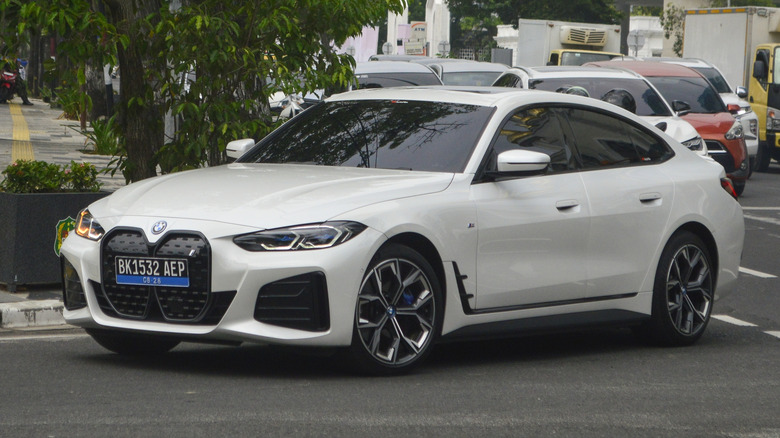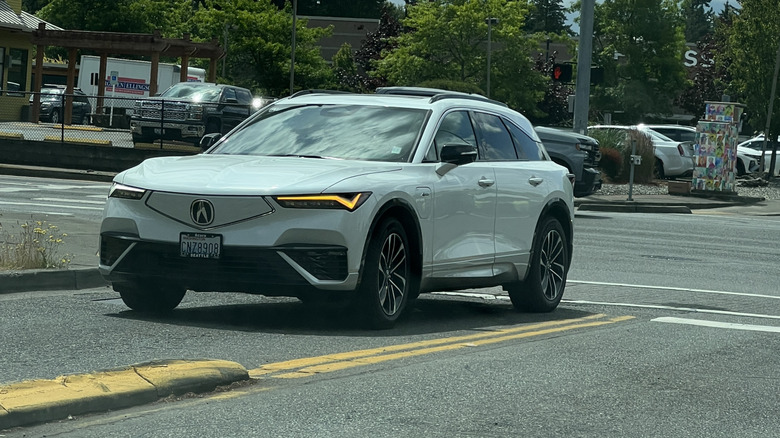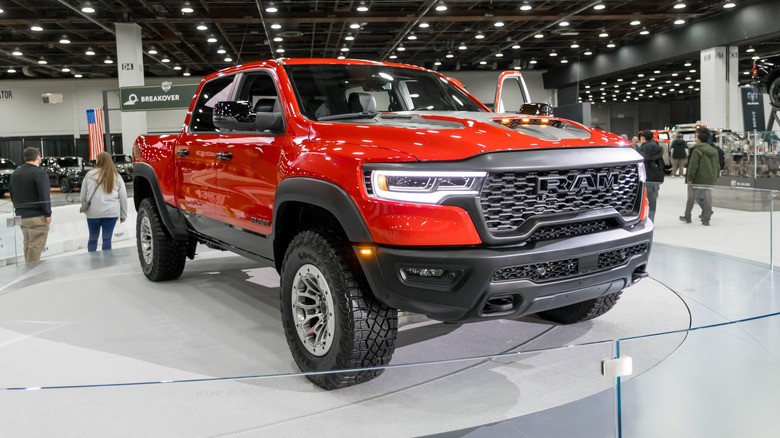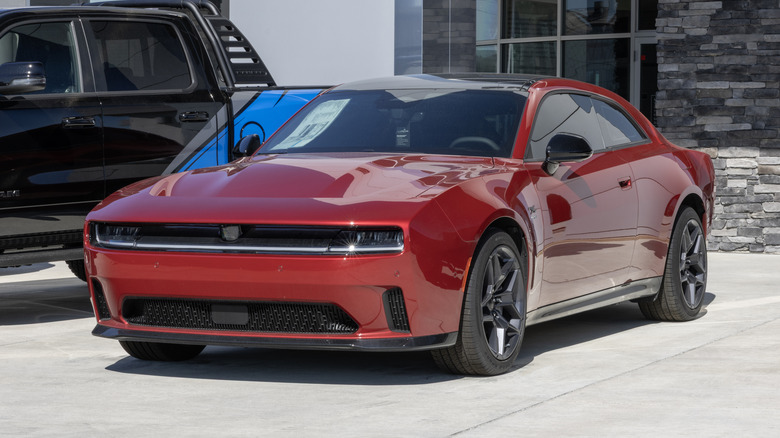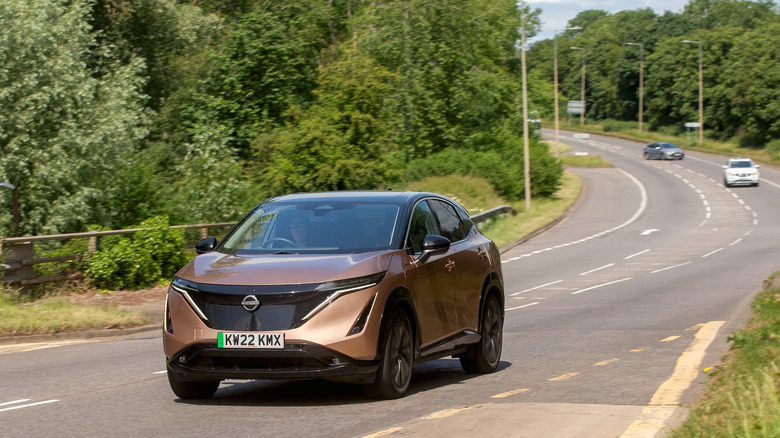5 Electric Vehicles That Won't Make It To 2026
Products rise and fall like the changing tides of the sea. Some go away, new ones launch — it's a never-ending dance between manufacturers and consumers that touches nearly every industry, including automotive. Vehicles can get phased out because they don't sell well, new or improved models become available, or something else entirely, like the parent company going under. In any case, there are a host of electric vehicles on the market this year that look like they won't be around for much longer, and certainly not in 2026.
If you're interested in owning one, you might want to hurry up and order, funds willing, because once they're gone, they're probably gone for good. Depending on how much used stock is available, that may or may not be an exaggeration. It depends on the market and how in demand these vehicles truly are.
Just to provide a few quick examples, some electric vehicles that are already gone, but not forgotten, include the Ford Focus Electric, Ford Ranger EV, Fiat 500e, BMW i3 (here's what happened), Toyota RAV4 EV, and Chevrolet S-10 EV (here are 13 EVs that have been discontinued in the U.S.). As for the electric vehicles that won't make it to 2026, here are five others that will make a few folks wince.
Acura ZDX
In September 2025, Acura officially announced that the ZDX, its first electric vehicle, would be discontinued. Part of the reason is because of slow EV adoption across the board, causing some automakers to backtrack on EVs. The electric model of the ZDX debuted in 2024, just a year prior to its cancellation. While not necessarily a standout in its class, the Acura ZDX is capable and enjoys a roomy interior. It features good fuel economy ratings (for an EV, anyway), with 313 miles per charge estimated for the rear-wheel-drive version and 278 miles per charge for the all-wheel-drive model. (The real-world results are lower for the all-wheel-drive model, according to Car and Driver's test of the vehicle.) Of course, if you know what you're doing, you can extend your electric vehicle's range in a few ways, hybrid or all-electric included. That could help eke out a little more range out of something like the Acura ZDX EV.
The ZDX EV was a suitable alternative to the Chevy Equinox, though a bit pricier than some of the other options in its class. That may change now that it's being discontinued, especially when it comes to used and pre-owned models. It remains to be seen how or if the discontinuation will change demand going forward. For now, it's worth noting that if you've been looking into the ZDX, you might want to pull the trigger soon. Or, you could wait until prices drop and dealerships are clearing out excess stock.
Dodge Ram 1500 REV
Dodge unveiled the Ram 1500 REV, an all-electric full-sized truck, in 2023, but it never quite made it to market. After several delays, Ram officially cancelled plans in September 2025, which means its rendition of a supercharged electric truck will never see the light of day. According to the company, it did so because of the slow demand for EVs in North America, but it's entirely likely the hassle wasn't worth the investment in the end. Consumer reports show that EV trucks are among some of the least reliable on the market, after all. You won't be able to buy the Ram 1500 EV new or used — you won't even be able to buy this model at all, actually. But don't fret: If you are looking for an EV truck, the REV models are staying in production, like the plug-in hybrid Ram 1500 planned to release soon.
The all-EV model is gone, but the Ram 1500 Ramcharger is still around the corner. The extended-range hybrid has two electric motors working together to produce 663 horsepower and 615 pound-feet of torque. It also uses a liquid-cooled battery pack offering up to 141 miles per charge. But that, too, has been delayed a year — it's set to release in early 2026 — and it remains to be seen what changes or upgrades will make it into the production model. The all-electric Ram 1500, on the other hand, was only ever a concept, and that's all it will ever be now.
Dodge Charger Daytona R/T
The Dodge Charger electric, the Daytona EV, comes in two trims for the 2025 model year, the Scat Pack and the R/T. Well, after just a year in production, Dodge is already phasing out the Daytona R/T model, leaving the would-be electric muscle drivers with just one option in 2026. While the EV model will technically still be around, which is a positive, it's sad to see some of that variety go. There are also rumors that Dodge cancelled development of another, even more powerful model called the Banshee EV. It's unfortunate to see because it's not like the muscle car EV market is flooded with options.
The model saying bye was capable of 496 horsepower, had all-wheel drive, and gave 308 miles per charge, a slightly better fuel economy than the 241 miles from the Scat Pack. No doubt the range difference is due to the higher horsepower and better performance in the Scat Pack model. Still, with a 0 to 60 miles per hour time at 4.7 seconds, the Dodge Charger Daytona R/T was impressively fast, but it didn't come close to some of the fastest electric vehicles in the world. That doesn't really matter, though — it still stings to see an EV that's fun to drive go away, even if it is only half of the model being postponed.
Nissan Ariya
Launched in 2023, the Nissan Ariya EV is apparently no more. According to the automaker, production has been officially halted for the U.S. market, but Nissan did say "paused" and not necessarily discontinued. The company has mentioned they're reallocating resources to the Leaf EV, another electric vehicle, so it's not abandoning the technology completely. The Leaf is also going to be more accessible, with a lower planned MSRP, which could be another reason why the Ariya is being phased out.
The 2025 Nissan Ariya is a compact all-electric SUV. Drivers can expect 205 miles from the Engage e-4orce model to 289 miles per charge from the Evolve+ option, and there's plenty of room inside with five available seats. It features a handsome yet unique design inside and out. The sophisticated cabin is a stunner, which is what makes the loss of this vehicle sting a little, more so because it's only been on the market for a short while. It will be interesting to see how well-received the upcoming Nissan Leaf EV is and also how long that one stays in production versus the Ariya's short but notable run. It does seem like most manufacturers are shifting focus to hybrid models overall rather than all-electric models, likely due to market demand cooling.
Genesis Electrified G80
The Genesis Electrified G80 was an electric car that looked nothing like an electric car. From the outside, you'd probably clock it as a luxury sedan, and that was certainly the goal. But it was also pretty expensive, starting at $77,000, up to an estimated $82,000 depending on the trim and features you choose. Maybe that's why it didn't sell as well, or maybe it's just that EVs in general aren't as exciting. Either way, Genesis announced that the Electrified model won't be returning in 2026. Initially, the company simply removed the vehicle's information from its website. It seemed like the EV would go quietly into the night, but Genesis did eventually make an announcement through the media.
What is somewhat surprising, if you can call it that, is that the Genesis Electrified G80 faithfully recreated the bulky sedan styling of its gas-powered sibling, the standard G80. People still weren't buying it. It appears consumers aren't all that interested in EVs that mimic gas counterparts well, beyond your average electric model, possibly indicating that no EVs are going to land the popular vote. No matter what they achieve and what they look, sound, or feel like. There's also the point that the federal tax credits for electric vehicle purchases expired in September 2025. Buying electric vehicles from the end of September and on will no longer net you any tax breaks at the end of the year.
